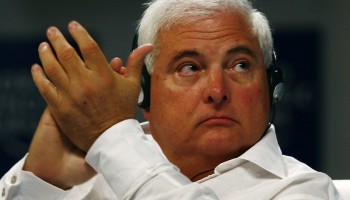Controversial mining magnate Beny Steinmetz, who has been facing legal troubles in multiple countries, has lost his appeal against a corruption conviction in Switzerland, the country’s supreme court announced on Friday.
The ruling means Steinmetz has exhausted all means of overturning a three-year sentence - half in jail, and half suspended - in Switzerland. He was convicted for having bribed the wife of a West African president to obtain one of the world’s richest deposits of iron ore. Switzerland’s supreme court, the Tribunal Fédéral, did, however, rule that his appeal against a 50 million Swiss franc fine ($59 million) should be sent back to a Geneva court for reassessment.
The supreme court has not yet provided the reasoning for its judgment.
Two of Steinmetz’s partners - one of them a middleman who has already faced jail time for obstructing justice in the U.S. - also lost their appeals against smaller, suspended sentences. The rulings were issued on 24 March but only made public Friday.
Steinmetz’s lawyers said the decision shows the “politicization of the Swiss judicial system”, and that he would seek to challenge the ruling at the European Court of Human Rights, according to Agence France-Presse, citing a statement. Steinmetz’s Swiss lawyers and communications advisers did not respond to requests for comment from OCCRP by the time of publication.
Agathe Duparc, an investigator at Swiss anti-corruption group Public Eye, welcomed the ruling. “This historic judgment, confirmed by the highest court in the land, sends a strong message.”
Steinmetz, 69, has protested his innocence throughout the Swiss case, which was launched by Geneva prosecutors with his August 2019 indictment. He is an Israeli resident, although OCCRP could not confirm his current whereabouts.
The corrupt scheme centred around bribe payments made by Steinmetz’s eponymous company, Beny Steinmetz Group Resources (BSGR), to obtain half of the mining rights to the Simandou mountains in Guinea, West Africa.
BSGR and a middleman company signed several contracts promising millions of dollars to Mamadie Touré, wife of Guinea’s late president Lansana Conté, for her help in securing the mining rights, a Geneva court found in its original conviction of Steinmetz in January 2021. Touré, in turn, put pressure on the president to grant BSGR the licenses.
The Geneva court had found that “significant efforts were taken to hide the corrupt enterprise,” including attempts to get Touré to destroy the incriminating contracts.
BSGR was granted the rights to Simandou blocks 1 and 2, covering the northern half of the range, on December 4, 2008. Although BSGR didn’t have to pay anything for the rights, it sold a 51% interest to major Brazilian miner Vale for $2.5 billion in April 2010.
Steinmetz has also been convicted in 2020 to five years in prison in a separate case, in Romania. He was found guilty for having formed an “organized criminal group” with Prince Paul Philippe of Romania and others, to fraudulently acquire over $100 million worth of real estate. He has fought off multiple attempts to extradite him over the matter, most recently in Greece’s Supreme Court last month. Steinmetz has denied any wrongdoing, and his lawyers have argued that extradition would breach his human rights, due to inhumane prison conditions in Romania.






